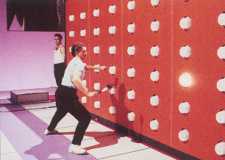Body Heat
Contents |
Host
Co-hosts
Jeremy Guscott and Sally Gunnell
Broadcast
Action Time and Central for ITV, 15 July 1994 to 31 December 1996 (23 episodes in 3 series + 1 special)
Co-produced by Carlton UK Productions, 1995-96
Synopsis
Three pairs of yuppies get all hot and sweaty through a variety of studio-based and outdoor exercises.
 Sally Gunnell (left), Jeremy Guscott (centre) and Mike Smith (right) with the winning pair of contestants after a special end-of-series final filmed on location somewhere tropical.
Sally Gunnell (left), Jeremy Guscott (centre) and Mike Smith (right) with the winning pair of contestants after a special end-of-series final filmed on location somewhere tropical.Rounds were varied, some better than others. Rounds featured included:
An opening race on gym equipment. It could be a 6km cycle ride, 3000 metres on a running machine, a 2000 metre rowing race or a race to the top of a tall building on climbing machines. A computer screen showed players progress in real time and confirmed the result at the end. For each gender, it was 100 points to the winner, 75 for second and 50 for third.
 The opening virtual race in action. The white boxes in front held televisions showing the competitor's positions.
The opening virtual race in action. The white boxes in front held televisions showing the competitor's positions.A somewhat silly quiz, based on fitness and nutrition questions, the twist being that contestants had to run a short distance to press the correct response button.
Pressure Point. This was always a filmed insert of the teams performing a pressure situation. The team that copes best got 200 points, then 150 and 100.
A Multi Stage Fitness Test. Basically a ‘bleep’ test, where contenders had to cover successive 30 metre lengths to a pace set by a bleep. After each minute, the time between bleeps decreases, forcing the contenders to speed up. But this takes time, so before this ended, we saw a film of...
Power Point. This tested players’ muscle strength with a machine that measured the power of arm and leg muscles. This produced a rating and for each gender, the best rating got 100, then 75 and 50, but there were bonuses for exceeding a target.
Back to the bleep test, and the rule is that missing the bleep three times in a row meant elimination. Scores were based on when players quit or were eliminated, and again for each gender, it is 100, 75 and 50, but women entering level 12 and men entering level 15 (after 11 and 14 minutes competition respectively) got 5 extra points for each length completed before quitting or being fouled out.
The final round changed between series. In early series, it was a Batak wall. Each player got 20 seconds each to hit a light on the wall with their baton. Then both players were in for the last 20 seconds. 10 points for each hit registered. In the last series, a Tri-Batak was used. Players had four minutes to swim 200 metres, cycle 400 metres and run 800 metres. ‘It doesn’t matter that one of you does 190 metres and the other ten, it’s the 200 total that is important.’ Only when this was completed do the two players go to the Batak wall and get the rest of the time (usually around one minute) to score ten points per hit.
 The Batak Attack. After an exhausting warm-up, the pairs of contestants take turns to hit the lit lights on the giant walls. The lights must be hit with the correct amount of pressure to score.
The Batak Attack. After an exhausting warm-up, the pairs of contestants take turns to hit the lit lights on the giant walls. The lights must be hit with the correct amount of pressure to score.A good format which serves its purpose well, but whether anyone gets truly excited about the outcome is debatable.
Inventor
Stephen Leahy, who also served as Executive Producer
Theme music
Simon Etchell
Trivia
A New Year's Eve Celebrity Special in 1996 featured Jane Gurnett, Du'aine Ladejo, Tristan Bancks, Oliver Skeete, Karen Dixon and that well-known athlete Sian Lloyd.
Videos
The very first episode.

